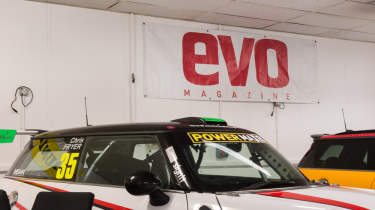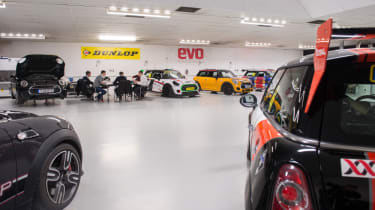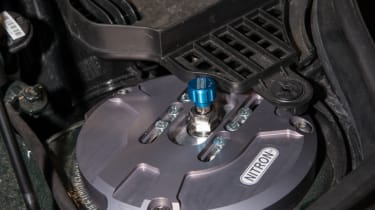Mini John Cooper Works Challenge official - evo helping develop UK-only track focused model
New hardcore F56-generation Mini set for imminent unveiling
We knew there was more to come. When we group-tested the Mini John Cooper Works against five of its closest rivals in evo 211, it finished an underwhelming fourth overall. It earned a decent four stars out of five, but it lacked the focus and intensity of the best hot hatches on the test. It was frustrating, not least because we suspected the squidgy all-season tyres were smothering a keen, agile and entertaining chassis.
Rather than banning us from testing its cars and scratching us from its Christmas-card list, Mini reached out to us. ‘We’re working on a special John Cooper Works,’ they said. ‘Would you like to get involved?’
Limited to a run of no more than 100 units, the John Cooper Works Challenge will be the most focused F56-generation Mini to date, and targeted at keen trackday drivers. A UK-only model, it’ll cost around £32,000 and the first cars will arrive in June this year.
>Read our Mini John Cooper Works review
At the heart of the project are three very passionate individuals, without whom the Challenge would not exist. They are Nicolas Griebner, Mini UK’s head of product; James Loukes, Mini John Cooper Works Challenge project leader; and Chris Fryer, driving dynamics test engineer.
The UK hot-hatch scene is thriving, reckons Griebner, and the Challenge will ‘cater to the growing number of customers looking for an even more focused John Cooper Works model’.
The list of enhancements will include uprated suspension – which will be adjustable – high-performance tyres and brakes, a limited-slip differential, lightweight wheels and a unique colour scheme. The manual-only Challenge won’t get any more power than the 228bhp base model, though, and in a nod to everyday usability it will retain rear seats, air conditioning and Bluetooth.
The JCW Challenge takes inspiration – as well as its name – from the Mini Challenge race series, which has been running for more than a decade. It’ll use components from the same companies that supply the race series, many of them British, with the suspension coming from Nitron, the differential from Quaife, the wheels from Team Dynamics and the brake pads from Mintex.
‘Quite often a manufacturer will say a road car is derived from a race car,’ says Griebner. ‘That might have been true in the ’60s and ’70s, but nowadays road cars and racing cars are quite different animals. In a credible way, however, we can say we are using the expertise of the Mini Challenge suppliers to achieve the feel of a racing car in a road car.’
‘We’ve worked closely with the suppliers,’ adds Loukes. ‘We haven’t just taken the damper from the racing car and put it on the road car, for instance. We’ve worked with Nitron to build a bespoke damper to suit.’
The dampers are two-way adjustable and owners will be able to tweak ride height and camber, too, which is almost unheard of in the hot-hatch sector. As standard, the Challenge will sit lower than the JCW and the springs and anti-roll bars will be stiffened for sharper handling. Mini will recommend two suspension settings – one for track and one for road – while affording owners a window of adjustability so they can fine-tune the car.
‘We’ve just done our first test on track, which went well,’ says Loukes. ‘We’ve gone through phase one of testing. Now we’ll go through various loops of continual testing until we find the perfect setup.’
‘It would be easy to pick the best parts out of a box and just throw them at the car,’ adds Fryer, ‘but we’ve got to integrate it all and make sure it all works together.
‘We’re testing all the time, on the road as well as the track. Each night James and I take a development car home. We also have a 45-minute test route around the office – on a real mixture of road types. For me the road is the bigger picture because that’s where the customer will be using the car the most.’
evo will be joining Loukes and Fryer at Oulton Park to have our say on tyres and suspension setup. You can read about the test session next month. Rest assured we’ll be encouraging them to squeeze every drop of potential from the JCW Challenge.
In depth
228bhp
The 2-litre turbo engine is unchanged from the standard JCW – it’s already amongst the most powerful in its class
< 1200kg
With lightweight wheels and a basic specification, the Challenge will be lighter than the standard JCW
50-100
The UK-only Challenge will be built in very limited numbers, with the final figure yet to be confirmed
6.0sec
With grippier tyres, the Challenge should reach 62mph in close to 6 seconds, down from 6.3
Chassis
With Nitron springs and dampers and front camber plates, the John Cooper Works Challenge will be the first fully adjustable Mini to date. It will also get stiffer anti-roll bars for sharper responses.
Brakes
The Challenge will use the grooved 330mm discs and four-piston Brembo calipers from the Mini Accessories catalogue. The bespoke Mintex pads, however, will be exclusive to the Challenge.
Differential
For the first time since the original GP model of 2006, a Mini will be fitted with a limited-slip differential. The automatic torque-biasing unit is supplied by Quaife, the same company that supplies the Mini Challenge race series.
Wheels
The Team Dynamics wheels save 1.5kg of rotational unsprung weight at each corner. They’re still 17 inches in diameter, but at 7.5 inches wide they are half an inch wider than the standard John Cooper Works wheels.






